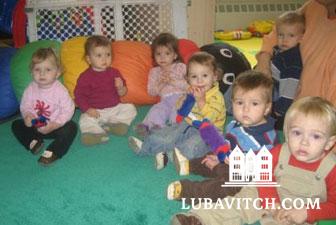(lubavitch.com/LNS) The world Jewish population climbed by 200,000 over the past year, says a Jerusalem-based think thank. That brings it in total to 13.2 million. But those who read on in the report quickly put away the party blowers: The projections for population growth are much more sobering.
Jewish People Policy Planning Institute reported that Jewish women in their 30s in the U.S. had about 1.2 children, while the general U.S. population checked in with 1.8 children. A fraction of a child doesn’t seem like much until it is viewed in future tense.
“The result is Jewish families with fewer children than the minimum necessary to maintain group size,” said the JPPPI in its annual report released last week.
With the right mix of socioeconomic incentives and societal support, the group offered, higher birth rates would result.
Unwilling to wait for acts of Congress to up the Jewish birthrate, Chabad representatives have been celebrating the joys of bringing Jewish children into the world, and their community members have followed.
With two little girls, a loving husband, a dog and a Volvo, Roberta Rosenthal thought her family was complete. Then she started attending Shabbat services at her local Chabad center.
As she and her husband took on a more observant lifestyle, the family grew. And grew. By pregnancy number five, “everyone thought I was crazy,” Roberta says. Even she began to question her own sanity. “I wasn’t brought up with this kind of life. I wasn’t sure what I was going to do, myself.”
She remembers the counsel from Rabbi Josh Gordon, Executive Director of Chabad of the Valley, like it was yesterday. “You’ll see,” he said. “This baby will be the joy of your life.”
In a nutshell, that’s the Chabad approach.
Where secular sources add up the cost of having a child – about a quarter mill ‘til the child is in college – the Lubavitcher Rebbe, Rabbi Menachem M. Schneerson, of blessed memory, asked potential parents to recall that G-d is a partner in the creation of every child. Children are a blessing, not a commodity ordered up on demand. Not only is having children the means G-d describes in the Torah for people to connect with the in Infinite, but bringing a child into the world adds goodness to the world and hopefully, with the right educational values, enduring pride to the parents.
When Chabad of Daytona’s regulars celebrate a lifecycle event–the birth of a baby, a bar mitzvah, a child’s engagement—Rabbi Pinchas Ezagui points out “how happy the grandparents and parents are. They see how clear it is that this is what life is all about.”
“People are so preoccupied with work and life, having children can be something that falls through the cracks. It helps people to focus on family life. Younger years move quickly than you think,” he said.
On the Simchat Torah holiday in 2006, a supporter pledged $10,000 toward Chabad’s new building for every child born in the community. To date, the donor has come up with over $130,000 in baby pledges.
Community members facing their forties flipping through magazines in the fertility doc’s waiting rooms have been known to stand up and urge their younger Daytonans not to put off starting their families. “There’s nothing more powerful than hearing someone tell you, don’t make the same mistakes I did,” one member ventures.
The expense of raising Jewish children, especially when tuition at Jewish day schools may be anywhere from $5,000 to double that per year, can put a damper on some of the enthusiasm for hosting another toothless member of the diaper class. When Roberta Rosenthal’s children were young, she wrote out tuition checks while thinking: “And this is my trip to Bermuda. And there is my cruise to the Bahamas.”
Answering the money crunch question is a matter of keeping parents’ third, silent Partner in mind. It’s a question that comes up quite naturally when people take in Rabbi Nechamia and D’vora Deitsch’s young and growing family. “They ask, ‘Why are you so motivated to have more kids. It’s so expensive?’”
Rabbi Deitsch, Chabad of Midtown, Toronto, said, “I always ask, ‘Did you know before you had one kid that would you be able to afford everything? No. You had a child, and somehow you were able to afford it.” And with a preschool that’s grown from 4 children to 47 with a vanload on the waiting list, his message must be getting through.
Of course, a larger family may entail a reordering of consumer habits. But many will agree that learning to make do, and creating a home environment where children learn to share with siblings, and to take joy in human beings rather than material things, is a good byproduct.
As for Roberta Rosenthal, Rabbi Gordon’s words also made their mark. She had baby number five. He’s strikingly handsome, has a fantastic sense of humor and should graduate college next year. “Those first few years were hard, but it was the best decision I ever made.”

Be the first to write a comment.